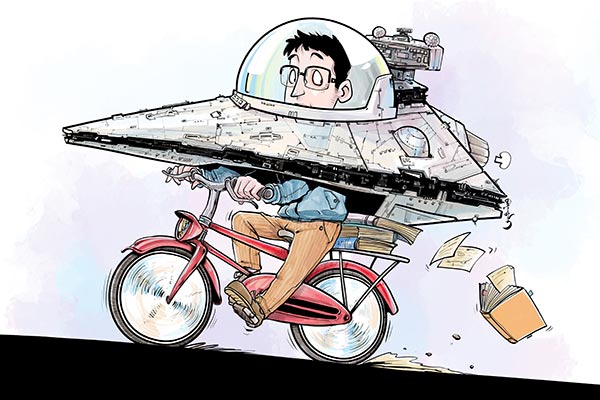The troubled universe of Chinese sci-fi
By Yang Yang ( China Daily ) Updated: 2015-10-17 10:08:46
 |
|
[Image by Cai Meng / China Daily] |
As five-thrills-a-minute page turners go, there is almost nothing to match it. One moment the metallic heroine of the tome stands astride barren red mountains, the mistress of all she surveys, the next she languishes in a dark ravine, the prisoner of some foul force, but ready to fight another day.
This is the world of Chinese science fiction, and the heroine in question is the genre itself, one year up, one year down and never quite sure of where it will be next.
At the moment one of its stars shines in the literary firmament, suggesting the genre is going through a purple patch in China, but look closer and you find that its health is more fragile than is first apparent.
First of all to that star, one that is decidedly not of the shooting kind, having been around for more than 15 years now and which burns more brightly than ever. This is by dint of the writer Liu Cixin in August winning a highly prestigious Hugo Award, which is given out at the annual World Science Fiction Convention.
The award, for best novel, was for his The Three-Body Problem, the first book of a trilogy. The Chinese edition of the entire trilogy have sold more than 2.1 million copies since 2007, leaving aside pirated e-books widely available online.
When it was announced that Liu had won the prize, investors immediately threw an extra 200 million yuan ($31.5 million) into the 1.4 billion yuan pot for making the movie adaptation of the trilogy. The first film, The Three-Body Problem, is to be released in China next July. Other works of fiction by Liu, including The Village Teacher, a short story, are also due to be turned into films.
Dazzled by the success of the Liu trilogy, big publishers began to sign-up young science fiction writers. People's Literature Publishing House, which put out the Chinese edition of the Harry Potter series, last month published a collection of best science fiction in China for 2014, and the State Administration of Press, Publication, Radio, Film and Television has applications pending for more than 20 science fiction movies.
One of the largest online bookstores in China, dangdang.com, has started a special science fiction section with more than 10,000 titles from home and abroad, and Liu's books account for half the top 20 bestsellers, the rest being from overseas.
So the question now is whether China's science fiction is about to match its promise and soar even higher or, as has happened before, fall back to earth with a thud.
"There are still many problems," says Yao Haijun, chief editor of the magazine Science Fiction World.
"For a start, many people say they can't even understand the Liu trilogy. Chinese sci-fi lacks maturity, not only in the quality of works and how they are distributed, but also in that it lacks a good, solid base or readers."
As soon as Liu's Hugo Award was announced, sales of the English edition of The Three-Body Problem gathered pace. However, Liu, even while exuding confidence to reporters that he had struck the sales jackpot, essentially told them that if they thought for a minute his winning the award would give a fillip to the status of science fiction in China they were dreaming.
|
|
|
|
|
|
|
|

























 Raymond Zhou:
Raymond Zhou: Pauline D Loh:
Pauline D Loh: Hot Pot
Hot Pot Eco China
Eco China China Dream
China Dream China Face
China Face






